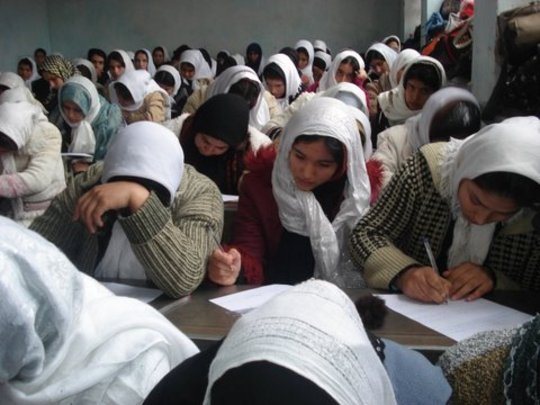Sakena Yacoobi and the Afghan Institute of Learning

A little over a year ago I read Greg Mortenson’s Stones into Schools, the sequel to his Three Cups of Tea and was very moved by it. An American, Mortenson describes his work collaborating with Afghan communities to provide schools for girls, while, at the same time, weaving his narrative with Afghan history and the role of education in empowering women and transforming communities. I put the book on my independent reading list for my students and ended up telling a number of people that they had to read this book.
Then, in April, along with countless others, I was disillusioned when Jon Krakauer (author of Into the Wild and Into Thin Air) published an essay exposing fault lines in the Mortenson story. I went online to discover what I could. A piece by Marc Maxson, a teacher who has done some work with Global Giving, caught my attention:
The real sad part is that for every Greg that destroys our public trust in non-profits, there are 99 other legitimate organizations doing the same work that suffer from it. The public generalizes their distrust to other organizations. So I am here to tell you that the real Greg Mortenson – by which I mean a leader in Afghanistan who has put over a hundred thousand girls in school and never exaggerated her impact, nor the daily threats she faces on her life for doing so, is none other than Sakena Yacoobi.
I happened to be reading Half the Sky at the time and then realized, aha, Yacoobi was one of the changemakers featured in the book.
I can’t fully know Greg Mortenson’s story. At best, he seems to have stretched the truth in places as well as perhaps allowed his organization to grow faster than he was able to sustain. What I’ve realized though is that I can take what’s good from his book – his enthusiasm for the role of education as transformative in Afghanistan – and, rather than generalizing my distrust, simply transfer my enthusiasm. Thus far, everything I’ve been able to find about Sakena Yacoobi points to the integrity and wisdom of her work.
Sakena Yacoobi is an Afghan Muslim woman, born and raised in Herat, who was able, with her parents’ blessing, to receive an education. She’s been paying this gift forward ever since.
Unable to attend Kabul University because of violence, she came to the United States, completing college and then a master’s degree in public health. She was working as a health consultant and college teacher in the U.S. when, in the early nineties, she traveled to Pakistan to visit Afghan refugee camps. Moved by what she saw in the camps, especially among the women and children, she moved to Pakistan, eventually bringing her work into Afghanistan. During that time, the Taliban barred girls from receiving an education. She responded by organizing secret underground schools in people’s homes, eighty in all.
In 1995, she founded the Afghan Institute of Learning (AIL), a grassroots organization whose mission is to provide education, especially to women and children. The AIL provides schools and teacher-training along with legal and human rights workshops. They’ve also expanded into health clinics and the training of nurse-midwives. Throughout, the emphasis is on training women to become leaders so that these centers for health and education can become independent.
Though they serve approximately 350,000 students a year, Ms. Yacoobi says there is still a long way to go. She travels with a bodyguard because of frequent threats on her life in the name of Islam. In an interview with Half the Sky authors, she says:
From my heart, I tell you: if they were educated, they would not behave like that. The Koran has quotation after quotation that says you must treat women well. Those people who do bad things, they are not educated . . . these people are afraid of educating women—they are afraid that the women will ask questions, will speak up . . . That’s why I believe in education. It is such a powerful tool to overcome poverty and rebuild the country. If we took the foreign aid that goes to guns and weapons and just took one quarter of that and put it into education, that would completely transform this country.
What is the saying? From her lips to God’s ears? From her lips to the world’s ears? If we took the foreign aid that goes to guns and weapons and just took one quarter of that and put it into education, that would completely transform this country.
Education as transformative. This is why she feels to me like the right choice to launch this healing corridor here. Her work is the kind of work that I want to support, in whatever way that I can.
[photo credit: Global Giving. I love how the students are concentrating in this photo – and writing!]
Donations to the AIL can be made online through Global Giving here.
See also:
Video by Skoll Foundation – this one shows the best glimpse of her work
Video interview with Sakena Yacoobi – a glimpse of her personal warmth, and wisdom
